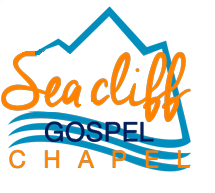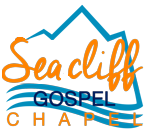“Sea Cliff Gospel Chapel, A Century of Proclaiming God’s Word, 1889-1989″
Origins: “…and let us exalt His name together.” PS.34:
The beginnings of the brethren movement started in a tiny Dublin house in 1825 for the purpose of finding a simple and Scriptural basis upon which Christians could meet. All forms of church order were subordinate to their holding Communion together
It was a time of upheaval when church members turned to Bible prophecy to try to understand the economic and social changes, revolution, and threats of cholera which plagued Europe at that time. Some people even refused to pay the church tithes and denounced the moral laxity of the clergy.
Since most of the church Services were formal and lifeless, the brethren leaders who were almost all thirty years and younger, encouraged people to participate in the Communion – to read aloud the Scriptures, to suggest a hymn to be sung or to comment on a portion of Scripture that would give praise to their Lord and Savior. Meeting times were arranged so that believers could also attend Services in their own churches. Communion was some- times held on Saturday nights and even on Mondays.
The Communion Service was a time of worship and remembering the Lord in the eating of bread and drinking of wine as Jesus taught in the last supper which was held on the first day of Unleavened bread (The Passover).
Jesus had sent his disciples, Peter and John, to a house in the neighborhood where they were to prepare the Passover meal. According to Luke, Jesus said to His disciples, “I have earnestly and intensely desired to eat this Passover with you before I suffer Then He took a loaf (of bread) and when He had given thanks He broke (it) and gave it to them saying, ‘This is My body which is given for you. Do this in remembrance of me.’ And in like manner He took the cup after supper, saying, ‘This cup is the new testament or covenant (ratified) in My blood, which is shed (poured out) for you'”
(Luke 22. Amplified New Testament)
Later they sang a hymn and went out.
The early brethren were highly trained in theology, having studied in Hebrew and Greek, and could discuss fine points of grammar and the exact meaning of words in Biblical translation. They debated with the great scholars of the period.
Among the leaders were J.G. Bellet (30), J.N. Darby (26), who translated the Bible into three modern languages and wrote many hymns, Lord Congleton (25), Henry Craik (27), Robert C. Chapman (29), Lady Powerscourt (30’s), Francis Hutchinson (27), Anthony Norris Groves (30), B. W. Newton (25) and George Mueller (27).These men believed that the Lord’s supper could be remembered wherever two or three were gathered in the name of the Lord Jesus which guaranteed His presence in their midst. Some of the country assemblies were small, but in the cities they were very large. Plymouth had a congregation of 1400, Hereford 345, Barnstaple 800, Dublin’s Merrior Hall 2500 and several Chapels in Bristol that each held over 400 people.
According to William Conrad, a brethren historian, the most able leaders were recognized as elders or appointed by such men as J. N. Darby. “These elders (Today we would call them full-time workers.) sat facing the congregation during Communion. In many cases these full time elders were called pastors. They firmly believed there was more than one man in every congregation gifted by the Holy Spirit for public preaching and teaching. But if one man was obviously a better public speaker, he would be asked to do the majority of preaching or teaching.” (Conrad.)
Much social work was done with the sick and the poor in Barnstaple, Bristol and London. George Mueller was the founder of English orphanages.
A tremendous amount of Christian literature was distributed. George Mueller printed and sent out, with the help of volunteers, millions of tracts every year.
In the evangelistic effort, tents were erected as in the early days of Sea Cliff. There was open air preaching. Homes, jails and hospitals were visited. Men would ride on horse -back to preach in outlying areas.
A question comes to mind as to how the full time elders were supported. Many of the first preachers were very wealthy and gave away their fortunes or kept a portion of their funds to support the ministry. Others helped support themselves through teaching. As is done in the Sea Cliff Gospel Chapel, donations (free will offerings) are dispersed by the treasurer as directed by the donors. These funds support a full time worker and maintain the church buildings.
Women played an important role in the assemblies. Lady Powerscourt sponsored prophecy conferences which became famous and added great impetus to the brethren movement.
Miss Bessie Paget, who was a great influence on A. N. Groves, founded and directed spiritual and social projects in Barnstaple.
Mary Peddeen served as joint superintendent of two Sunday Schools and did a great deal of social work.
Women wrote hymns which are still used in Communion services all over the world.
As the brethren movement grew, thousands of congregations sprung up on every continent. Today there are 1500 missionaries in the field without salary, depending solely on the voluntary gifts of Christians to carry out the work of spreading the gospel, caring for the sick and teaching in the schools.

